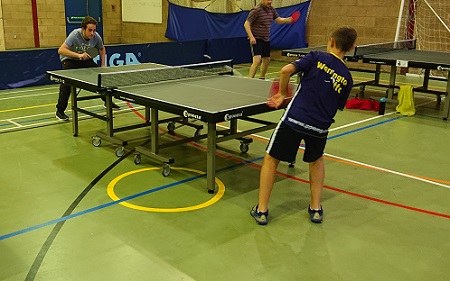Playing table tennis can help your chess. It's not just a question of getting some exercise and thus facilitating the flow of blood to your brain. There are habits and attitudes that are very useful for chess players and having a second activity can help console you if the first one goes badly. As Mark Taimanov said after he was battered 6-0 by Bobby Fischer: "I still have my music."
My son Sam has been playing table tennis for around 18 months and it has helped him a lot in many ways. We started by having a knock about on a table at a shopping mall and then progressed on to having some games in a bar with a table tennis table in it. Unfortunately (or maybe fortunately) he was asked his age after a few visits and it turned out that he was not allowed in there. So we needed to come up with an alternative and found that we could hire a table at a local leisure centre.
Never one to do things by halves I suggested we find a coach and started taking lessons. After a couple of months of lessons, and dedicated practice of everything we were taught, Sam was good enough to play at a club. This is now a regular Monday night activity, he's playing in a League team some other evenings and we are doing tournaments! From a parenting point of view this is a bit like going to chess tournaments, though your offspring needs a bat instead of a pen and the parents do not usually get a quiet place to sit. After being pelted with table tennis balls on a few occasions I now retire to the car. Sam is pictured below playing at his club:

So how does table tennis help your chess? First of all there are no draws, so you get used to playing a game with just two outcomes, a win or a loss. The practice ethic is similar to chess but when people see its importance in a second activity it becomes a universal rule of excellence. The psychological aspects are also similar, but in table tennis you have to play the ball when it comes to you, there is no time to delay or think about it. This in turn makes the possibility to think into something that is valued. I could go on but the most important point is this; Sam's chess has been transformed of late so that he is now far more pugnacious and more willing to take calculated risks.
Of course it does not need to be table tennis or even any kind of sport, there are other activities which have great value. Since taking up tai chi over a decade ago I have found it to be a wonderful way to get away from the stress of competition and I would not want to be without it. Though I should mention that to go deep into any activity needs time, and this in turn means that you should not try to do too many of them. I know of many children who are encouraged to try a vast range of activities, never practice any of them (there simply is not time) and do not progress at any of them. I would say that two or three is enough for most people, and perhaps just one if time is very limited.
Nigel Davies
